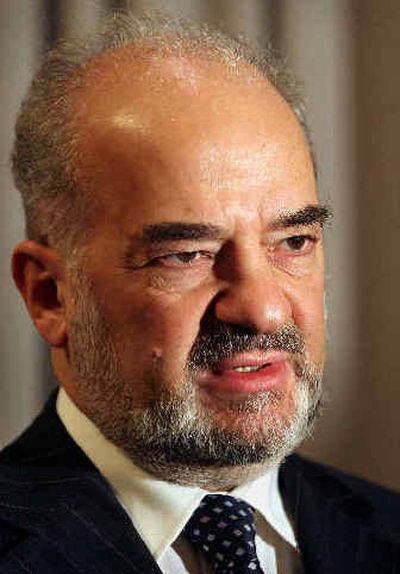Top prime minister candidate vows moderation

BAGHDAD, Iraq – The shy family doctor who became the leading candidate for prime minister Tuesday says ending the nation’s rampant violence is his top priority and that U.S. troops would remain as long as they are needed to achieve that goal.
In an exclusive Associated Press interview, Ibrahim al-Jaafari, a 58-year-old moderate Shiite Muslim politician who fled a brutal crackdown by Saddam Hussein in 1980, also talked about drafting a constitution that will draw not only on Islam for inspiration.
“Islam should be the official religion of the country, and one of the main sources for legislation, along with other sources that do not harm Muslim sensibilities,” said al-Jaafari, who currently serves as Iraq’s interim vice president and was living in London until Saddam’s regime was overthrown.
He said he supports women’s rights, including the right to be the president or prime minister, as well as self-determination and individual freedoms for all Iraqis.
The interview took place in the office of al-Jaafari’s home in the U.S.-guarded Green Zone in central Baghdad. Islamic art, much of it Quranic verses with intricate Arabic calligraphy in gold that are common in Iraq, adorned the walls. An Iraqi flag was hanging from a pole set on a floor stand in the background. A computer was on his desk.
Ashraf Qazi, the U.N. envoy to Iraq, was waiting outside as al-Jaafari’s staff prepared fish and rice for their dinner meeting.
Al-Jaafari, the leader of the Dawa Party, became the top contender for Iraq’s top government post after his main rival, Adel Abdul Mahdi, dropped out. Ahmad Chalabi, a former Pentagon favorite, was still in the running for prime minister, but was considered by many to be a long shot.
“We have two candidates for the alliance, Ahmad Chalabi and Ibrahim al-Jaafari, but al-Jaafari is the most likely to be the alliance candidate,” said Humam Hamoudi, a spokesman for the Shiite political alliance that has provisionally won more than half the seats in the new National Assembly.
But Chalabi remains a compromise candidate and could be picked as an alternative to al-Jaafari if opposition to him is too high among Kurds, who took 26 percent of the vote, and Sunni Arabs, who largely stayed away from the polls but whose participation may be needed to quell the stubborn insurgency.
The alliance is endorsed by Grand Ayatollah Ali al-Sistani, the spiritual leader of Iraqi Shiites. One of Sistani’s aides told the AP on Tuesday that he has refused to endorse a single candidate for prime minister, but has let it be known in the past that he would support al-Jaafari.
Al-Jaafari, who spoke Arabic during the interview, said that recent deals among Iraq’s religious parties pointed toward his victory.
“I hear from here and there, but I can’t tell to what extent it is a consensus,” he said, wearing a blue suit, a polka-dot tie and a neatly trimmed gray beard. “I feel like some of our brothers are convinced, but it takes time to reach consensus.”
Al-Jaafari said that if he is confirmed as prime minister, he would first try to stymie the violence that has crippled the country’s recovery from decades of war and hardship.
“The security situation is at the top, as it is a pressing element,” al-Jaafari said. As a result, he said he would not push for the United States and its allies to withdraw their troops from Iraq any time soon.
But al-Jaafar has kept some distance from the U.S. occupation. He boycotted a U.S.-organized meeting of Iraqi politicians near the biblical city of Ur in April 2003. While he served on the Governing Council appointed by the U.S. government after the invasion, he turned down an offer of protection. But he did serve on the council and became vice president of the interim government.